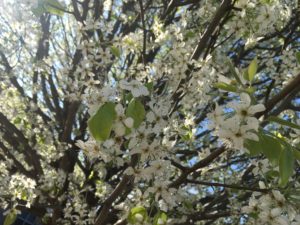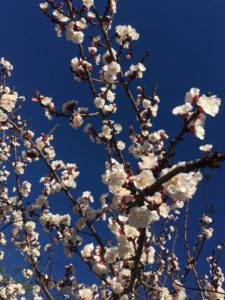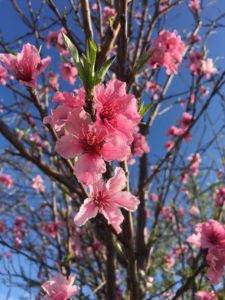This is a blogpost with two points that negate each other. Yes, that means it is a post that should logically take you all over in a circuitous route and leave you where you started, rather like a Russian novel. But if you read your Bible carefully, doesn’t Christianity seem to do the same thing sometimes? Grace and justice, man’s culpability and God’s sovereignty, the list goes on. They are called antinomies; two things that seem to be opposites but still manage to gel together somehow. This is a blogpost with an antinomy.
The Broken Promise
Bradford pear trees are in bloom all over my neighborhood. There are gorgeous white blooms bursting into flower and making me grin like a fool when I go walking the dogs and baby. Sometimes you see whole fields of wildflowers, but more often you find isolated blooms, or small clumps. Here is bloom after bloom, flower mounted on flower, so many blossoms the delicate petals are pressed up against each other trying to find room.

When I saw it, my first thought was for the beauty. The second was a little thrill of excitement; “What are those flowers going to become?” I grew up around cherry and apple trees. A flowering tree means fruit is coming. Something yummy, homegrown, and probably juicy is going to be growing soon on that tree. It is an expectation. A promise of something.
My husband and I were driving to a friend’s house for games and chicken a few days after I began enjoying the blooming trees, and I saw more of them. It seemed like everywhere I looked was a stately tree clothed in white, almost glowing in the sun. I pointed one out and commented on it to Patrick. “That’s a Bradford pear," he said. "They don’t actually grow pears though, just blossom.”
Something shattered then. Just a little something, but still. The expectation was gone. The promise broken. Those blooms were little liars. Nothing at all was going to come from them, they just put out blossoms and then stuck out their proverbial tongues and said, “Oh, psyche, we didn’t actually mean it!”
“Wherefore by their fruits ye shall know them.” (Matthew 7:20)
We are supposed to be good trees, bearing fruit for our Master. What does it say of us if we produce nothing? We might blossom beautifully. But what does that do except promise something else? This is the man who talks big but does little. The Christian who looks amazing on the outside, with the perfect house, perfect kids, always smiling in church, always looking so good; but if we had God’s vision we might see they aren’t going anywhere. Beautiful, maybe. But are they just blossoming and not producing? Are we good at promising, but never actually fulfilling that promise?
Sanctification matters. What you do doesn’t save you, get up and walk away from any situation that tries to tell you your actions count toward your salvation. But after we are saved, what we do still matters to God. And to our fellow men. Sanctification matters. Growing in grace, actually growing the fruits that those first beautiful blossoms promised, God cares about that. He wants to see you serving Him, loving others, learning to love Him more everyday. We are called to grow in our salvation, to take the blossoms that flower at God’s grace and (with the Spirit’s help) shape them into actual fruits, that please our Maker.
Don’t be a Bradford pear tree, all blossoms and no fruit. Be a pear tree that actually grows pears.
Honey is Good
You might have noticed, when reading the above point, that my first instinctive action when spying these trees in bloom wasn’t expectation over the fruit they would bring. That was the second thought. The first was much more experiential, a reaction, an emotion with no thought behind it.
Delighted joy at the beauty.
Whole fields of blossoms, so delicate you can almost see the sun shining through them, with the rays colored to match the flowers, all of it suspended in the air. They reach for heaven, as if a hundred tiny arms are raised in praise of their Creator. Calm, unaltered by the barking dogs or rushing cars, serene and gorgeous in their stateliness. A perfect cacophony of beauty against the blue sky, each one matching its neighbor so that the very cacophony is turned into an ordered symphony singing out praise and joy and beauty.

God made the Bradford pear tree. It doesn’t grow pears. It grows blossoms. That’s all. Just blossoms in the spring and leaves in summer and fall. Yes, if you want to get technical, it has photosynthesis that takes our waste and recycles it into oxygen which lets us live; but have you ever stopped to consider that God could have done that by making giant black boxes sunk in the bare earth? That’s probably how we Americans would have solved the problem. But not our God. He made trees. God made trees that blossom. God made flowers that grow in the air.
“My son, eat thou honey, because it is good;” (Proverbs 24:13)
This is one of my favorite verses, because it seems so unnecessary. Eat honey, why? Because it is good. All of us do it. Every human does things because they enjoy it. But what other religion says that it’s right? Have you ever thought that fact of eating something just because it is good, liking something just because it is beautiful, might be a factor of our being made in the image of God?
God made the Bradford pear. God made trees that grow flowers in the air. And that’s all they do. God cares about beauty. God cares about beauty for beauty’s sake.
Every one of those delicate blooms are fashioned by God’s hand, crafted with a finesse of a master artist, and why? Because they are beautiful. He is a God of order, of design, Who makes things that work incredibly and indescribably efficiently well. But He also makes things beautiful. Have you ever stood in front of the painting of a Dutch master and been awed by the life-like details and beauty of the mundane? They knew this point. They payed attention to their Christianity and knew that God cared about the everyday value of objects and “the normal working man” and also for the beauty of a thing. They created beauty out of what the rest of us look on as ordinary. God created the thing we call beauty. Do you think He cares how you do the jobs He has given you? Efficient, yes, be that. But take it the next step. Look beyond the usefulness of life and remember to enjoy the beauty. You don’t have to feel guilty for it. God made the Bradford pear.
We don’t have to be austere. We don’t have to be serious or even working all the time. Should we be working at our sanctification and trying to please God all the time? Of course. But having a little fun, enjoying the beauty of a blossom, or a quiet piece of chocolate and cup of tea, is perfectly allowable in the world of the Christian God. We are called to be useful, to bear fruit. But before the fruit comes the blossom. And the blossom has a value all by itself. Beauty is not just a byproduct. It has a place in God’s ordered world. Foods that taste good have their place. Pictures that are beautiful are a way to praise God. They can even be evangelistic tools for some people. Humanity is made for more than just work. God made us to praise Him too, and part of that is noticing the beauty and enjoying it for the sake of the beauty. Take a moment to stop and stare at a flower. To make a cup of tea because it is good. To laugh with a friend because the joke is funny. And you don’t have to feel guilty about it, like God is waiting for you to get back to “real life.”
After all, He made the Bradford pear. It grows a field of blossoms in the air, and lifts a hundred stick-thin arms to heaven in praise. It is for beauty, nothing more. But that is enough.
Grow a Bradford pear. And let it point people to the God Who creates flowers because they are beautiful.
